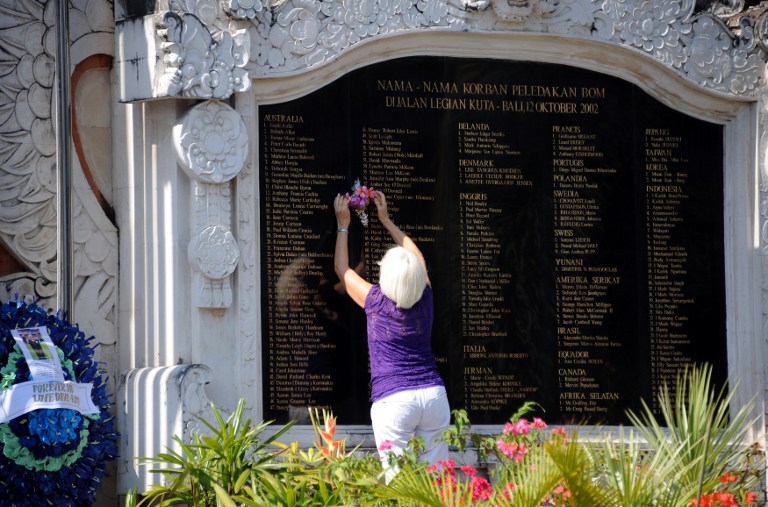SUMMARY
This is AI generated summarization, which may have errors. For context, always refer to the full article.

KUTA, Indonesia – Indonesia declared its top security alert Wednesday, October 10, citing “credible information” of a threat to a ceremony this week marking the 10th anniversary of the Bali bombings which killed 202 people.
Shrugging off the warning, Australian Prime Minister Julia Gillard vowed to attend Friday’s (October 12) service in Bali for the victims of suicide attacks against two packed nightspots on October 12, 2002, which included 88 Australians.
Indonesia’s deadliest terror attack, by the Al-Qaeda-linked group Jemaah Islamiyah (JI), opened an Asia front in the war on terrorism one year after the 9/11 attacks on the United States and dealt a morale-crushing blow to Australia.
“Based on credible information, the terrorists have planned to target the Bali bombing commemoration event with a terror attack,” Bali deputy police chief I Ketut Untung Yoga Ana told AFP.
“Security at all entry points to Bali, such as airports and seaports will be intensified,” he said, adding that security was at the “highest level”.
“We are taking extraordinary security measures following this threat,” he said, after earlier announcing that 1,000 security personnel including snipers, heavily armed police commandos and intelligence agents had been deployed.
Access to the memorial venue will be tightly controlled in the days leading to the ceremony with sniffer dogs and bomb detection devices set to be used at all entrances, he added.
Gillard is due to give an address to commemorate the Australians who were among the victims of the strike against the Sari Club and Paddy’s Bar in the Indonesian tourist island’s nightlife strip of Kuta.
Asked in Sydney whether she was concerned about travelling to Bali, Gillard said: “I do want to be in Bali for the 10-year commemorations.”
“Families will be traveling there. It will be a day in which we pay our respects and remember what that moment was like for Australians.”
Friends and families of victims have poured into Bali for Friday’s service, some meeting at the “ground zero” site of the attacks or laying flowers at an adjacent stone memorial inscribed with the names of the dead.
A group of regular police stood guard next to the Kuta memorial on Wednesday afternoon with armed police patrolling the beach area, an AFP photographer saw.
The Kuta attacks 10 years ago plunged Indonesia — which has the world’s largest number of Muslims — into the war on militancy and battered Bali’s tourist-reliant economy.
Tourism to Bali, which is dominated by Australian visitors, was just beginning to recover in 2005 when another suicide blast killed 20 people as they dined at the beachfront Jimbaran district.
Today, Bali’s fortunes have recovered fully and Indonesia has won praise for a crackdown on militants that has left all the leading Bali perpetrators either executed, killed by police or jailed.
The nation has not seen a major attack since 2009 when blasts at two five-star hotels in Jakarta killed nine, and more than 700 JI members have been killed or put behind bars.
Bali is on track to lure a record one million Australian arrivals this year as tourists flock back to the Hindu-majority island, which is renowned for its pristine beaches, wild nightlife and welcoming locals.
But despite the apparent recovery, the 2002 atrocity is seared into the memory of Indonesians — 38 of whom perished in the blasts — and Wednesday’s terror threat rekindled dark memories of the previous attacks.
“Bali used to be safe but you never know anymore,” said hotel developer Boy Harlin, whose friend was badly burned in the 2002 bombings.
“I’m in the hospitality industry and all my buyers ran away after the attacks, so another attack is the last thing I want to happen.”
For many Australians the bombings were a direct attack on their country.
“This memorial is just another step in the journey, because it’s something that will never go away,” said Keith Pearce, 65, who flew from Perth with around 30 members of his Australian Rules football club which lost seven young men.
“Each year when we have an anniversary, you look into the boys’ eyes and you can see it’s still very raw for them.”
There are also fears that although crippled, Jemaah Islamiyah is far from defeated, with old names cropping up in new terror cells that aspire to impose an Islamic caliphate across Southeast Asia by violent means.
“The current threat in Indonesia is at a different scale from what it was a decade ago,” International Crisis Group Southeast Asia project director Jim Della-Giacoma told AFP.
“But recent police raids on suspected terrorists show that the threat continues and that there’s still a lot of radical thought and ideology.” – Angela Dewan, Agence France-Presse
Add a comment
How does this make you feel?
There are no comments yet. Add your comment to start the conversation.